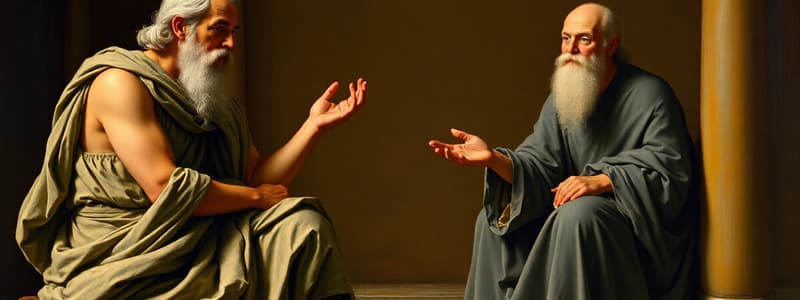Podcast
Questions and Answers
What characterizes a moral argument?
What characterizes a moral argument?
- It involves claims about what is right or wrong. (correct)
- It is entirely based on subjective opinions.
- It does not require supporting premises.
- It includes only descriptive statements.
What distinguishes a deductive argument from an inductive argument?
What distinguishes a deductive argument from an inductive argument?
- An inductive argument cannot have true premises.
- A deductive argument suggests that the conclusion is likely true.
- A deductive argument guarantees the truth of the conclusion if the premises are true. (correct)
- An inductive argument consists only of hypothetical premises.
Why is an invalid argument considered invalid?
Why is an invalid argument considered invalid?
- It is based solely on ethical reasoning.
- It contains at least one normative claim.
- It has false premises.
- It does not guarantee a true conclusion even if the premises are true. (correct)
What is the main focus of normative claims?
What is the main focus of normative claims?
Which of the following is NOT a component of an ethical theory?
Which of the following is NOT a component of an ethical theory?
How does an extensional definition differ from an intensional definition?
How does an extensional definition differ from an intensional definition?
What is the primary role of a moral principle?
What is the primary role of a moral principle?
Which of the following accurately describes virtue theory?
Which of the following accurately describes virtue theory?
What does virtue theory primarily focus on?
What does virtue theory primarily focus on?
Which of the following best describes consequentialism?
Which of the following best describes consequentialism?
What is a characteristic of a techne?
What is a characteristic of a techne?
What is the Euthyphro dilemma concerned with?
What is the Euthyphro dilemma concerned with?
Why does Socrates state that he only knows nothing?
Why does Socrates state that he only knows nothing?
What role did sophists play in ancient Athens?
What role did sophists play in ancient Athens?
In what way does Socrates approach his defense in court?
In what way does Socrates approach his defense in court?
What distinguishes Socrates from sophists?
What distinguishes Socrates from sophists?
What does Socrates' theory of recollection suggest about learning?
What does Socrates' theory of recollection suggest about learning?
What is Socrates' view on whether virtue can be taught?
What is Socrates' view on whether virtue can be taught?
Who was Gorgias and what was his profession?
Who was Gorgias and what was his profession?
Why does Socrates emphasize the importance of oratory's purpose?
Why does Socrates emphasize the importance of oratory's purpose?
What major problem does Socrates identify with rhetoric?
What major problem does Socrates identify with rhetoric?
According to Socrates, why are tyrants considered the least powerful?
According to Socrates, why are tyrants considered the least powerful?
How does Socrates view oratory and sophistry?
How does Socrates view oratory and sophistry?
What does Polus claim about the act of doing injustice?
What does Polus claim about the act of doing injustice?
What does Socrates argue entitles him to meals in the Prytaneum for life?
What does Socrates argue entitles him to meals in the Prytaneum for life?
Why does Socrates feel it is necessary to remain in Athens?
Why does Socrates feel it is necessary to remain in Athens?
What issue does Socrates raise about defining courage solely as 'endurance'?
What issue does Socrates raise about defining courage solely as 'endurance'?
What conclusion does the dialogue in 'Laches' reach regarding the definition of virtue?
What conclusion does the dialogue in 'Laches' reach regarding the definition of virtue?
How does Socrates' priority in definition theory influence his view on teaching virtue?
How does Socrates' priority in definition theory influence his view on teaching virtue?
What distinguishes knowledge from true belief, according to Socrates?
What distinguishes knowledge from true belief, according to Socrates?
What is Socrates' stance on the 'unexamined life'?
What is Socrates' stance on the 'unexamined life'?
Why does Socrates reject participation in injustice?
Why does Socrates reject participation in injustice?
What is the basis for determining the good of a thing according to Aristotle?
What is the basis for determining the good of a thing according to Aristotle?
How does Aristotle believe individuals can be trained to be morally good?
How does Aristotle believe individuals can be trained to be morally good?
What distinguishes a character virtue for Aristotle?
What distinguishes a character virtue for Aristotle?
What type of action involves both voluntary and involuntary elements?
What type of action involves both voluntary and involuntary elements?
How does Aristotle differentiate between natural and conventional justice?
How does Aristotle differentiate between natural and conventional justice?
What allows for the possibility of akrasia in Aristotle's view?
What allows for the possibility of akrasia in Aristotle's view?
What defines a friend in Aristotle's philosophy?
What defines a friend in Aristotle's philosophy?
What is a unique characteristic of virtue friendship according to Aristotle?
What is a unique characteristic of virtue friendship according to Aristotle?
Flashcards are hidden until you start studying
Study Notes
Socrates' Theory of Recollection
- Learning is recollecting past knowledge already held by the soul
- Solves the problem of how we acquire knowledge
Socrates and Virtue
- Skeptical - virtue's definition is unclear, so teaching it is difficult
Gorgias
- Prominent sophist, rhetorician, known as a persuasive speaker and teacher of rhetoric
Socrates on Oratory
- Focus on the truth and justice, not manipulation
Gorgias' Downfall
- Inference that rhetoric can be used immorally for persuasion
- Undermines rhetoric's integrity
Socrates' Refutation of Gorgias' Argument: Legitimacy
- Misunderstanding or misrepresentation of Gorgias' position
Shoemaker's Argument about the Refutation
- Refutation should be understood within the concept of "techne" (craft)
- Emphasizes rhetoric's ethical dimensions
Polus' Perspective
- Socrates did not refute Gorgias
- Focused on rhetoric's practical power and effectiveness
Polus' Injustice Argument
- Better to do injustice than suffer it
- Socrates argues that doing injustice harms the soul
The Least Powerful Tyrants
- Tyrants lack true virtue
- Enslaved by desires
Political Techne
- The art of governance and leadership
- Medicine is a counterpart for the body
Socrates' View of Oratory and Sophistry
- Lack true knowledge
- Focus on persuasion without ethics
Callicles' Justice Distiction
- Natural justice: Universal, based on nature
- Conventional justice : Societal, varies across cultures
Argumentation and Definition
- Argument : Set of statements where one (conclusion) is supported by others (premises)
- Moral Argument: Claims about what is right or wrong, good or bad, based on ethical principles
- Normative Claim: How things "ought" to be; not always moral claims
- Deductive Argument: Guarantees a true conclusion if the premises are true
- Inductive Argument: Conclusion is likely based on premises
- Valid Argument : Structure guarantees a true conclusion if the premises are true
- Invalid Arguments: No such guarantee
- Extensional Definition: Specifies members of a set or group
- Intensional Definition: Specifies properties or characteristics of a term
Ethical Theory Fundamentals
- Moral Principle : General guide for ethical behaviour
- Ethical Theory : Systematic framework, explains how moral principles apply
- Factors of an ethical theory:
- Normative Principles
- Methodology for reasoning
- Applications in real life
Ethical Theories
- Virtue Theory : Focuses on the character of the moral agent (e.g, honest, courageous)
- Consequentialism : Rightness or wrongness of actions depends on outcomes
- Non-Consequentialism : Morality is NOT determined by consequences
- Kantian ethics: Emphasizes rules and duties
Euthyphro
- First Definition of Piety: Extensional
- Euthyphro's Failed Definition: "What the gods love"
- Circular reasoning
Euthyphro Dilemma
- Questioning whether moral goodness is independent of the gods
- Challenges divine command theory
The Apology
- Techne: Craft, knowledge-based, aimed at a goal
- Socrates and Knowledge : "The only thing I know is that I know nothing"
- Sophists : Teachers emphasizing rhetoric and persuasion
Socrates' Defense
- Defense for the sake of the jury, not himself
- Not a sophist - seeks truth and betterment of the soul
- Aristophanes' Play "Clouds": Portrays Socrates as corrupting the youth and distorting truth
Socrates' Contributions
- Deserves meals in the Prytaneum (a reward)
- Continued to philosophize, it was his duty
Socrates and Justice
- Refused to participate in unjust actions
- Continued to philosophize if released from prison
Socrates on Life
- "The unexamined life is not worth living"
- Self-reflection and critical questioning are essential
The Laches
- Courage Definition: "Endurance" fails
- True Courage: Character and moral integrity of the individual
- Universal Definition of Courage: Applies to all forms of courage
- Dialogue ends without a definitive conclusion
The Meno
- Socrates prioritizes definition
- Focus on the essence of concepts before application
- Knowledge is more valuable than true belief
Aristotle and Virtue
- The good of a thing is determined by its purpose or function
- Habituation: Practice virtuous actions
- Character Virtue: Stable disposition to act according to reason
- Golden Mean: Balance between excess and deficiency
- Voluntary Action: Knowledge, control of origin
- Mixed Action: Voluntary and involuntary
Aristotle on Justice
- Natural Justice : Universal
- Conventional Justice : Societal
- Decency (Reasonableness) : Acting according to reason
- Corrective Justice: Restoring balance, achieving fairness, not merit
- Akrasia : Knowing what is right but being swayed by passions
- Friendship Definition: Mutual goodwill and concern for the other's well-being
- Types of Incomplete Friendship : Utility and Pleasure
Virtue Friendship
- 基于相互欣赏和美德,不易受到环境或兴趣变化的影响。
- Stable, based on mutual admiration of virtue.
Studying That Suits You
Use AI to generate personalized quizzes and flashcards to suit your learning preferences.




